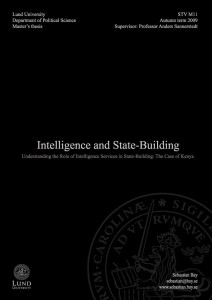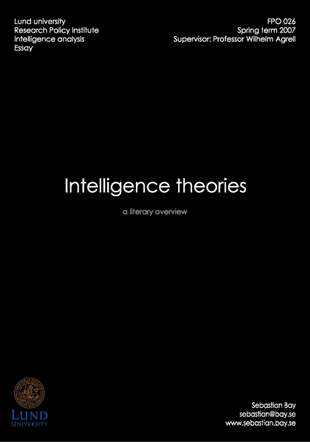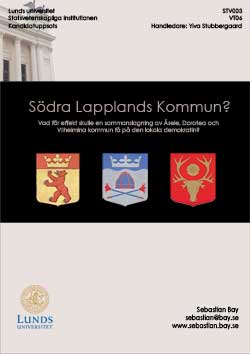Posts filed under 'Research papers'
Understanding the Role of Intelligence Services in State-Building: The Case of Kenya
 The intelligence sector of any state plays a major role in safeguarding national security, and in the extreme, it acts to preserve the very survival of the state. Even though maintaining effective control and oversight over intelligence services is as important to the democracy “as maintaining control over the armed forces, intelligence services have received much less attention from scholars and those supporting the democratization process” (Caparini 2007, 3).
The intelligence sector of any state plays a major role in safeguarding national security, and in the extreme, it acts to preserve the very survival of the state. Even though maintaining effective control and oversight over intelligence services is as important to the democracy “as maintaining control over the armed forces, intelligence services have received much less attention from scholars and those supporting the democratization process” (Caparini 2007, 3).
The research available about intelligence services in developing countries is mediocre at best and research is virtually non-existent regarding intelligence and state-building. We know very little about the role of intelligence services in the making of states in general and postcolonial states in particular (cf. Goscha 2007, 100f; Chappuis and Hänggi 2009, 31).
Reforming intelligence services in emerging democracies is one of the most important and difficult activities facing any government. In order to achieve democratic consolidation, controlling intelligence services is vital for several reasons. First, as the organization in charge of internal security and regime protection, it is important that it operates within the rule of law without abusing its authority. Second, authority and civilian control are needed to ensure that the elected government holds genuine control over the monopoly on violence. If this is not achieved the intelligence services risks remaining or becoming a state within a state effectively preventing democratic consolidation (cf. Macdonald 2007, 301; Bruneau 2001, 337; Boraz 2009, 84).
Even though the role of intelligence services is essential for liberal, open, and democratic state-building to occur, we know little of the exact role of intelligence services in the state-building process. I believe that it is important to better
understand this process in order to be able to enhance support for the democratization process in emerging democracies, something that is even truer regarding African states, where academic research traditionally has had a difficult time understanding state-building (cf. Herbst 2000, 3f). If authoritarian regimes are to reform the tools and manuals must be available, precisely and simply explained by Wilson Boinett:
“I believe [former Kenyan President] Moi wanted to reform the Special Branch but he did not know how to proceed. It had never been done in a similar context before and there was no information available on what to do or how to proceed.” (Boinett 2010).
Aim and purpose
“Intelligence, if we understand it, might some day be more clearly a force for good. If intelligence is ever to be a force for good, then it must be studied. We can bet that, if we remain ignorant of it, intelligence will certainly be a force for ill.” (Warner 2009, 29f).
The purpose of this thesis is to contribute to the development of a theory about the role of intelligence services in state-building. To this end I have studied and analyzed the role of the Kenyan intelligence services in the Kenyan state-building endeavor. My ambition has been to use the Kenyan experience to better understand what role intelligence services play in state-building.
While such a case study might say little about how intelligence universally influences statebuilding, it does, I argue, work towards providing a framework for how such a relationship can work, thereby offering a theoretical approach to the subject. The goal is to inform, inspire and offer a set of theoretical spectacles that can be used to view other cases. To this end my research is using the Kenyan experience to develop a number of theoretical approached to the role of intelligence services in state-building.
Download the Master’s Thesis here: Intelligence and State-Building
June 4th, 2010
 “Don’t worry, it’s a slam dunk!” (Tenet cited in Woodward 2004, p.249).
“Don’t worry, it’s a slam dunk!” (Tenet cited in Woodward 2004, p.249).
If former Director of Central Intelligence George Tenet had known that those six words he was about to utter that December morning would become a symbol for the greatest intelligence failure since Pearl Harbor, he might have chosen his words more carefully.
Many have asked what Tenet could and should have known. Just as many have asked whether or not he was influenced in his assessment by various groups of policymakers to the extent that he was forced to provide an answer he knew to be false. Fewer have asked what the limits of intelligence analysis are, and even fewer have asked what can be known and where the boundaries of knowledge are drawn in the field of intelligence.
The intelligence failures of 9/11, Iraq, London, Bali, Madrid and Istanbul have enforced the notion of intelligence as broken, defective and in urgent need of being fixed. Among scholars, this debate has given rise to a surge of activity and discussion and has led to the notion held by many that the field is conceptually weak and in need of theorizing.
How are policies that guide the intelligence services formed and guided? On what assumptions are they based? What is the intellectual and ideological divide? Theory guides us to find these answers, and the study of intelligence must be carried on under this veil to be explicit. Discussions about intelligence theory and the development of conceptual and theoretical thinking about intelligence are here to stay. These discussions are vibrant and sometimes difficult, as new thoughts and provocative ideas challenge how things are and should be done. Even if the contribution of theoretical thinking to the field of intelligence is questioned, it will by all means revolutionize and open up the academic field of intelligence analysis. Theory has become the new “in” in intelligence.
Continue reading my essay here: Intelligence theories – a literary overview
June 17th, 2009
 Syftet med min kandidatuppsats i statsvetenskap har varit att avgöra vad för effekt en sammanslagning av Åsele, Dorotea och Vilhelmina kommun skulle få på den lokala demokratin; i uppsatsen definierad av min demokratiska idealtyp.
Syftet med min kandidatuppsats i statsvetenskap har varit att avgöra vad för effekt en sammanslagning av Åsele, Dorotea och Vilhelmina kommun skulle få på den lokala demokratin; i uppsatsen definierad av min demokratiska idealtyp.
Uppsatsen visar att den demokratiska enhet som skulle skapas av en kommunsammanslagning inte stämmer överens med den idealtyp som jag valt att konstruera.
En storkommun bestående av Åsele, Dorotea och Vilhelmina kommun riskerar att försvåra och minska det demokratiska deltagandet. Det demokratiska styret i en storkommun skulle påvisa bristande legitimitet och det skulle saknas en gemensam identitet.
Men samtidigt visar dessa resultat också på möjligheter eftersom alla dessa variabler i viss mån kan påverkas. Identiteter kan ändras visar tidigare kommunforskning, legitimitet kan skapas och deltagande kan förenklas och uppmuntras. Detta betyder att en sammanslagning med nödvändighet inte behöver innebära en försämrad demokrati såsom definierad av min demokratiska idealtyp. Snarare visar mina resultat på vilka faktorer som måste tas hänsyn till om man vill bibehålla eller stärka den lokala demokratin.
Det måste betonas att det som åsyftas i uppsatsen är analytiska snarare än statistiska generaliseringar. Inga anspråk görs för att hävda att de generaliseringar som gjorts och slutsatser som dragits här också gäller för andra kommuner än de studerade, för andra tidsperioder eller för andra demokratiska variabler. Jag är ödmjuk inför det faktum att det är svårt att dra långtgående slutsatser utifrån ett enda fall. Det har heller inte varit mitt syfte med denna uppsats.’
Samtidigt bidrar studien kumulativt till den övergripande nomotetiska forskningen av kommunsammanslagningars effekt på den lokala demokratin. Som sådan understryker den vad tidigare forskning visat, nämligen att fokuserar man på de tre demokratiska variablerna legitimitet, identitet och deltagande så påverkas dessa variabler negativt vid en kommun-sammanslagning. Inte nödvändigtvis av processen som sådan utan av den demokratiska enhet som blir resultatet.
Ladda ner uppsatsen: Kandidatuppsats i Statsvetenskap – Södra Lapplands Kommun?
English Abstract
In 1974 the three municipalities of Åsele, Dorotea and Fredrika were amalgamated despite of hunger strikes, mass protests and a serious threat of violence. But after six years the marriage shattered as Dorotea left the other two after years of continued struggle. In 2005 the idea of an amalgamation of Åsele, Dorotea and Vilhelmina municipalities was brought to life by an older and ever declining population.
By creating a democratic ideal type consisting of the three variables – legitimacy, participation and identity – this study assesses what impact an amalgamation of the three municipalities might have on local democracy. Combining a qualitative and a quantitative approach this study concludes that amalgamating the municipalities today could create a democratic unit lacking legitimacy, having a weak identity and impeding participation.
But the study also brings forth that the impact of an amalgamation upon the variables of the ideal type as defined is not written in stone. Rather by careful though and consideration a number of the negative impacts upon the ideal type can be erased or reduced. As such democracy is not static but can be enhanced or undermined by conscious effort.
September 2nd, 2007
Den 25 juli 2006 inträffade en händelse på Forsmark 1 som skulle kunna ha lett till en katastrof av samma mått som Harrisburg 1979. Till skillnad från Harrisburg lyckades en olycka avvärjas på Forsmark 1 denna gång och driften återupptogs utan några katastrofala efterföljder. Denna händelse är mycket aktuell då vi idag lever i en värld som präglas av de effekter på miljön som vår moderna tid skapar och kärnkraftverk som energikällor är starkt ifrågasatta. Charles Perrow har forskat kring risk och de orsaker som gör att olyckor inträffar. Denna forskning har lett fram till en teori som Perrow kallar Normal Accident Theory. Perrows teori går i korthet ut på att definiera vilka system som, utifrån begreppen koppling och komplexitet, kan benämnas högrisksystem. Högrisksystem är enligt Perrow, de system som är uppbyggda med täta kopplingar samt är komplexa till sin karaktär. På grund av dessa systems karaktär menar Perrow att oförutsedda olyckor oundvikligen kommer att inträffa, och att det inte är en fråga om, utan när dessa kommer att ske.
Vi vill med vår studie pröva huruvida Charles Perrows teori fortfarande kan förklara risker och uppkomsten till kriser tjugo år efter att den först formulerades. I vår studie har vi således valt att testa Perrows teori på den incident som inträffade på kärnkraftverket Forsmark 1 den 25 juli 2006. Vi ställer oss frågan: Styrker händelsen vid Forsmark 1 Charles Perrows Normal accident theory? Detta leder oss vidare in i en diskussion kring huruvida högrisksystem, enligt Perrows definition, verkligen existerar.
Vår studie kring händelsen på Forsmark 1 har visat att den tekniska förklaringsmodellen som Perrow står för inte ensam kan förklara händelsen på Forsmark 1. Vi gör dock inte gällande att teorin inte alls är gångbar, utan konstaterar endast att Charles Perrows Normal Accident Theory inte stärks av vår analys av händelsen på Forsmark 1. För att förstå dess fulla dynamik menar vi att det förmodligen krävs en komplettering med andra teorier.
Ladda ner uppsatsen:
Normal olycka på Forsmark 1? En reflektion över Charles Perrows teori om normala olyckor
January 29th, 2007
Natten mellan den 19 och 20 mars 2003 inledde koalitionstrupper Operation Iraqi Freedom. Detta var slutet på det som kom att gå till historien som Irakkrisen.
30 år tidigare formulerade Graham Allison en teori, i form av tre modeller, för att förklara utrikespolitiskt agerande utifrån Kubakrisen. Vi har prövat huruvida Allisons teori fortfarande kan förklara utrikespolitiskt agerande genom att pröva den på Irakkrisen. Detta har operationaliserats genom en systematisk genomgång av tillgängligt material som behandlar uppsatsämnet.
Efter att ha betraktat Irakkrisen utifrån Allisons tre olika modeller kan vi konstatera att teorin fortfarande är bärkraftig. Dock behövs viss komplettering till den 30 år gamla teorin – i form av en inrikespolitisk analys, bredare organisationsanalys samt en djupare value- och beliefsystem-analys – för att kunna åstadkomma en fylligare undersökning som förenar Allisons modeller med dagens verklighet.
Nyckelord: Allison, USA, Irakkrisen, Beslutsfattande, Teoriprövande.
Uppsatsen skriven av:
Sebastian Bay och Björn McClintock
Ladda ner hela uppsatsen här
February 1st, 2006
 The intelligence sector of any state plays a major role in safeguarding national security, and in the extreme, it acts to preserve the very survival of the state. Even though maintaining effective control and oversight over intelligence services is as important to the democracy “as maintaining control over the armed forces, intelligence services have received much less attention from scholars and those supporting the democratization process” (Caparini 2007, 3).
The intelligence sector of any state plays a major role in safeguarding national security, and in the extreme, it acts to preserve the very survival of the state. Even though maintaining effective control and oversight over intelligence services is as important to the democracy “as maintaining control over the armed forces, intelligence services have received much less attention from scholars and those supporting the democratization process” (Caparini 2007, 3).
